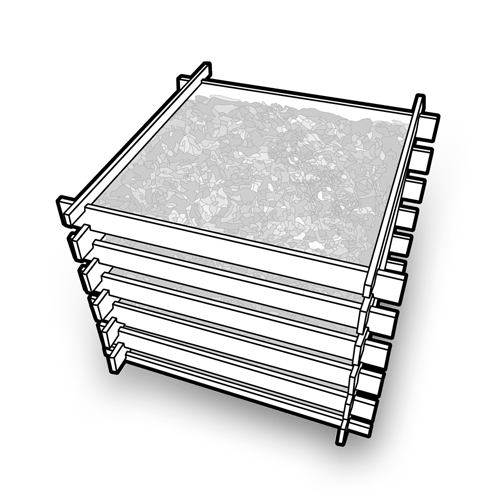Sorting waste is essential for it to be recycled or processed in a way that pollutes as little as possible. Facilitate sorting for staff as well as customers. There are various ways of storing and putting out waste for collection:

- yellow sacks: clean waste carton and paper packaging material ; in most communes the use of a carton box/container can replace the yellow sack.
- blue sacks (recyclable waste): bottles, flasks and packaging in plastic (indicated by the number 1, 2 or 3 in a triangle for transparent plastic; the numbers 4 to 8 are not for recyclable plastic – cans of beer, tins, metal covers and caps of jars and bottles, aluminium plates, cartons and trays, aerosols containing cosmetic or food products, ...
- compost: mostly food waste is in this category (peelings, uneaten food, ...EXCEPT for rhubarb leaves), paper tissues, coffee grounds and filters, tea bags, sawdust, garden waste (attention: they must not be carriers of illness, germinated or chemically treated), hair and animal fur. Be sure not to put inside grease, dairy products or chemicals. (‘green cone’ solution or biologically active)
- white sacks (non-recyclable waste): certain plastic packaging, polluted packaging which cannot be recycled any more,...
- specific chemical waste (food grade oils, fat tank residue, dangerous waste and its polluted packaging) will be collected at permanent or mobile ‘greens points’ placed at the disposal of your preferred waste collector, or can possibly be deposited in a container park.
- container parks for cumbersome waste or all sorted waste which has not yet been put out for collection.
- glass bins can be used to deposit sorted glass packaging (pay attention to the colour of the glass and be sure to remove corks and covers,...). However, some products are excluded: crystal, window panes and mirrors, light bulbs and neon tubes, porcelain, glass which is resistant to high temperature.
You can opt for a waste collector of your choice to cart away waste of all kinds. The cost of collection will vary with the collection company, the type and quantities of waste for which the collector will be responsible and the complexity of the processing.
Environmental benefits
- Reduced Waste generation
- Reduced soil, air and water pollution
Reduced costs
Waste sorting generally reduces the direct costs of waste management, as separately collected waste handling fees are usually much lower than the handling of mixed waste. For many types of waste (eg, electrical and electronic equipment waste, cardboard packaging, metal scrap) the handling fee may be completely absent or even positive (ie, they can be sold).
Waste management costs, including the cost of waste collection largely depends on how it is organized (the choice of collection possibilities and sharing with other companies, frequency of emptying the containers, etc.).
